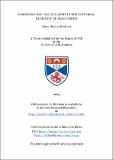Files in this item
Communio Dei : particularity in the universal humanity of Jesus Christ
Item metadata
| dc.contributor.advisor | Cockayne, Joshua | |
| dc.contributor.advisor | Torrance, Andrew | |
| dc.contributor.author | Everhart, Drew Thomas | |
| dc.coverage.spatial | 222 | en_US |
| dc.date.accessioned | 2023-05-09T09:49:32Z | |
| dc.date.available | 2023-05-09T09:49:32Z | |
| dc.date.issued | 2023-06-16 | |
| dc.identifier.uri | https://hdl.handle.net/10023/27533 | |
| dc.description.abstract | This thesis explores the role of particularity, especially racial and gendered particularity, in human nature through an exploration of Christological anthropology. If all humanity is revealed and redeemed in Christ’s particular humanity, what does it mean that Christ became human in particular ways, such as his maleness and Palestinian-Jewishness? Specifically, what does Christ’s assumption of a particular humanity mean for our own particularity as human beings made in his Image. Many feminist Christologies argue that this makes Christ unqualified to save women, while theologies of race often emphasize the solidarity of Christ with black and brown bodies. Particularity appears to play a significant role in our being human, but it also appears to make salvific union with Christ impossible for some. Instead, this thesis argues that human nature ought to be conceived of in onto-relational terms, so that human beings are constituted by their relations to other persons within the created order. Human nature is not defined by a set of properties held in common by all, but by a shared telos for communion with God, fellow-humanity, and the created order. In such a communion, called the communio Dei, human persons share second-personally that which is particular to themselves with others in a human reflection of divine perichoresis. Human nature is thus created to be an essentially diverse community united not by a common set of features or faculties, but by a shared telos to be a community comprised of every tribe, tongue, and nation united in worship of YHWH. Christ embodies this in how he transforms the relationship between particularities, such as race and gender, so that alienated peoples may have loving, self-giving communion with one another in the Spirit-wrought community, the body of Christ. | en_US |
| dc.language.iso | en | en_US |
| dc.subject | Christology | en_US |
| dc.subject | Theological anthropology | en_US |
| dc.subject | Particularity | en_US |
| dc.subject | Social ontology | en_US |
| dc.subject | Analytic theology | en_US |
| dc.subject | Science-engaged theology | en_US |
| dc.subject | Image of God | en_US |
| dc.subject | Human nature | en_US |
| dc.subject | Theology of race | en_US |
| dc.subject | Theology of gender | en_US |
| dc.subject.lcc | BT203.E84 | |
| dc.subject.lcsh | Jesus Christ--Person and offices | en |
| dc.subject.lcsh | Theological anthropology--Christianity | en |
| dc.subject.lcsh | Particularism (Theology) | en |
| dc.title | Communio Dei : particularity in the universal humanity of Jesus Christ | en_US |
| dc.type | Thesis | en_US |
| dc.type.qualificationlevel | Doctoral | en_US |
| dc.type.qualificationname | PhD Doctor of Philosophy | en_US |
| dc.publisher.institution | The University of St Andrews | en_US |
| dc.identifier.doi | https://doi.org/10.17630/sta/426 |
This item appears in the following Collection(s)
Items in the St Andrews Research Repository are protected by copyright, with all rights reserved, unless otherwise indicated.

